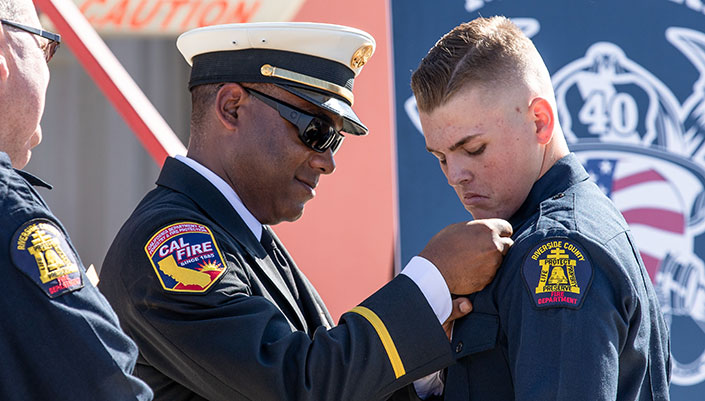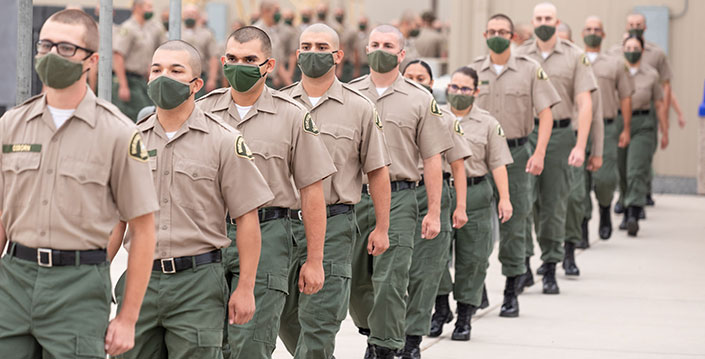Ben Clark Training Center Awarded Education Center Status by the California Community Colleges Board of Governors
03/24/2021

The California Community Colleges Board of Governors voted to move forward Moreno Valley College's Ben Clark Training Center (BCTC) as an educational center beginning July 1.
By earning education-center status, BCTC stands to increase apportionment funding; be eligible for additional state capital outlay resources; and reduce the need for leased operational space. It is projected that the additional apportionment could mean as much as $1.3 million, beginning in the 2022-23 academic year. Based on the current apportionment base and grants and other revenue opportunities, BCTC financial means to grow to as much as $7 million.
It has been an arduous journey.
For nearly a decade, it has been the intent of Riverside Community College District and Moreno Valley College to apply to the California Post-Secondary Education Commission and California Community College System Board of Governor's for the establishment of an education center at BCTC due to anticipated benefits.
In 2010, Riverside Community College District approved a resolution to begin the pursuit of center status for BCTC. However, shortly after approving the resolution, the California Community Colleges Chancellor's Office issued a moratorium on the designation of education centers. Then in 2019, following the lifting of the moratorium by the State Chancellor's office, MVC resumed its pursuit for BCTC.
In January of 2019, the RCCD Board of Trustees approved a ground lease which the Riverside County Board of Supervisors approved the following month. Having a ground lease provided the District with possessory interest to design and construct an education facility at BCTC.
“While the process has been an arduous one, it was critical to see the Ben Clark Training Center become recognized as an educational center," Wolde-Ab Isaac, Ph.D., chancellor of RCCD, said. “BCTC has been a key developer of public service workers, many who remain in the community providing key emergency and medical services for residents. In order to continue to grow the programs it was important for BCTC to reach educational-center status."
In 2014, Riverside County was projected to experience an 18 percent population growth over the next 10 years. Some of the Employment Development Department's fastest job growth included areas that are taught at BCTC, including emergency medical technicians and paramedics.
While earning educational-center status will allow the College to provide additional student support, it could very well lend itself to the expansion of the public safety programs as well as the development of additional programs beneficial to the community. The College recently completed a 3,642-square-foot Correctional Scenario Training Building for the Law Enforcement program. In the fall of 2022, the College anticipates opening a new 14,000-square-foot facility for the School of Public Safety/Advanced Correctional Training program. BCTC came under educational control of MVC in 2006.
“Achievement of education center status for MVC/Ben Clark Training Center is a milestone achievement Robin Steinback, Ph.D., president of MVC, said. “It validates our vision and what we accomplish each and every day to ensure our region has leading-edge programs in fire technology, emergency services, and law enforcement training. I am tremendously proud of our faculty and employees, and the partners and employers with whom we work, preparing our graduates for well-paying careers that serve our community, now and in the future."
The transition from an outreach center to a state approved educational center is a multi-step process, beginning with the submission of a letter of intent. The Chancellor's Office Facilities Planning and Utilization Unit reviews, and if approved, the district completes a needs assessment. Pursuant to Title 5 CCR §§ 55180-55180 and California Education Code §§ 7090-70902, a needs assessment must provide findings from a comprehensive analysis of the following 10 elements:
-
-
- General discussion and overview of the proposal.
- Ten-year enrollment projections.
- An analysis of alternatives.
- Academic planning and program justification.
- Student services and outreach.
- Support and capital outlay projections.
- Geographic and physical accessibility.
- Effects on other institutions.
- Environmental impact.
- Economic efficiency
- General discussion and overview of the proposal.
-

211 — Basic Peace Officer Academies
92 — Basic Correctional Academies
43 — Fire Academies
21 — Paramedic Academies
253 — EMT Academies
Regionally, BCTC is unique since it provides the only public safety education and training opportunity for law enforcement, fire service and emergency medical services. Demand for public safety sector training is expected to experience growth in the county. Receiving educational-center status will enable the College to expanded programs and services and create Emergency Services Management and Emergency Medical Dispatch degree and certificate tracks.
For nearly 70 years, RCCD has orchestrated public safety training and education opportunities in conjunction with community partners. In November of 1995, BCTC was made possible by the realignment of March Air Force Base. The Joint Powers Authority set aside acreage in the western portion of the base as a means to create a Riverside County Sheriff's Training Academy. The area encompassed nearly 400 acres and included buildings and facilities which were home to the former non-commissioned Officers Academy and the 15th Air Force Headquarters.
Today's vision for a public safety training facility was realized when the California Department of Forestry and Fire Protection (now CALFIRE)/Riverside County Fire Department entered into a formal alliance with the Riverside County Sheriff's Department at the time March Air Force Base was being realigned from an active military base to a reserve base. The location was designated the Ben Clark Public Safety Training Center by resolution of the Riverside County Board of Supervisors on September 24, 1996. CALFIRE/Riverside County Fire Department and Riverside County Sheriff's Department training programs were moved to the BCTC with a facility management team with key representatives from each agency in order to provide oversight and direction.
Today, BCTC is one of the largest public safety training centers in Southern California. BCTC offers subject areas and general education leading to certificates and degrees, as well as basic and advanced training to public safety personnel. Each year, the Center prepares hundreds of students to work as law enforcement officers, firefighters, paramedics, emergency medical technicians, correctional officers, dispatchers, probation officers, and juvenile correctional counselors.
BCTC remains a partnership between MVC, Riverside County Sheriff's Department, California Department of Forestry & Fire Protection, Riverside County Fire Department, California Highway Patrol, and Riverside County Probation Department.
“It is only because of these key community partners that RCCD and the College could reach this point in BCTC's history," said Mary Figueroa, a 26-year member and current president of the RCCD Board, and a retired 21-year correctional counselor at the California Institution for Men in Chino for the State of California Department of Corrections. “To see how BCTC has grown and evolved since I first was elected to the Board is amazing. It is the commitment by current College officials and earlier founders who envisioned a center that would transform the region when it came to public safety. I am just so proud of what has been accomplished on behalf of the region."
Published by External Relations & Strategic Communications

